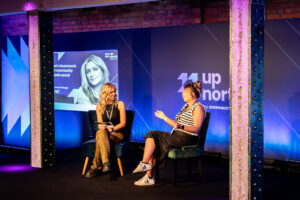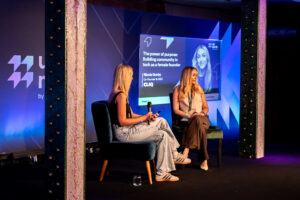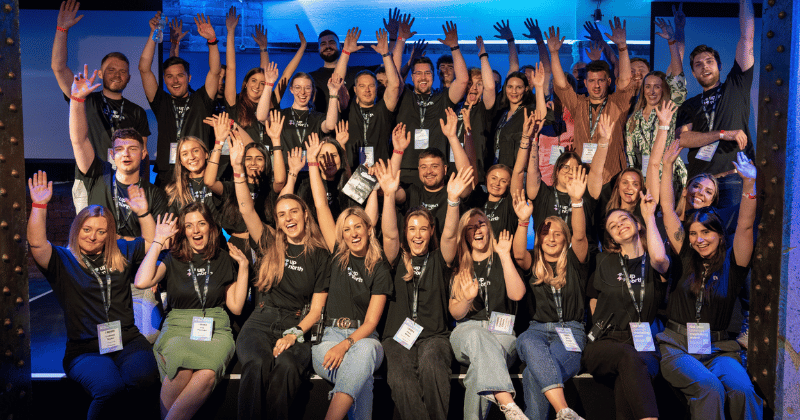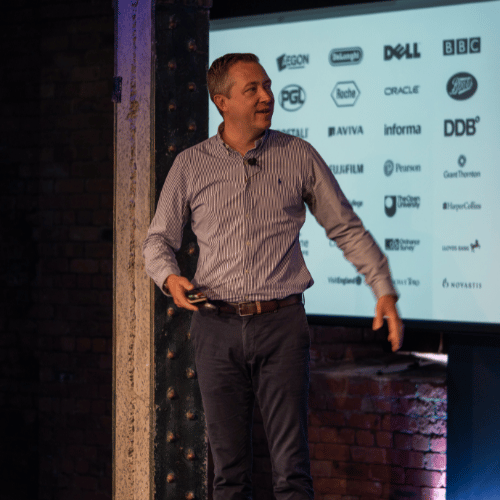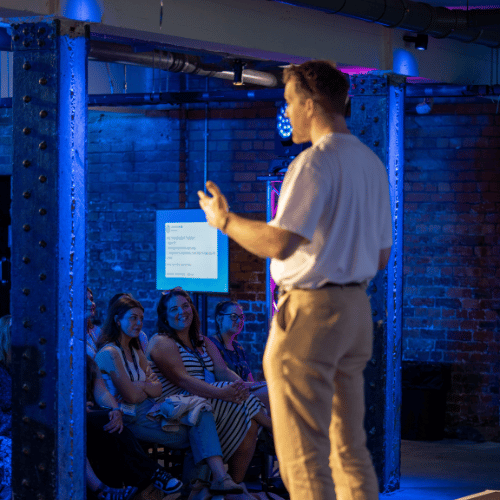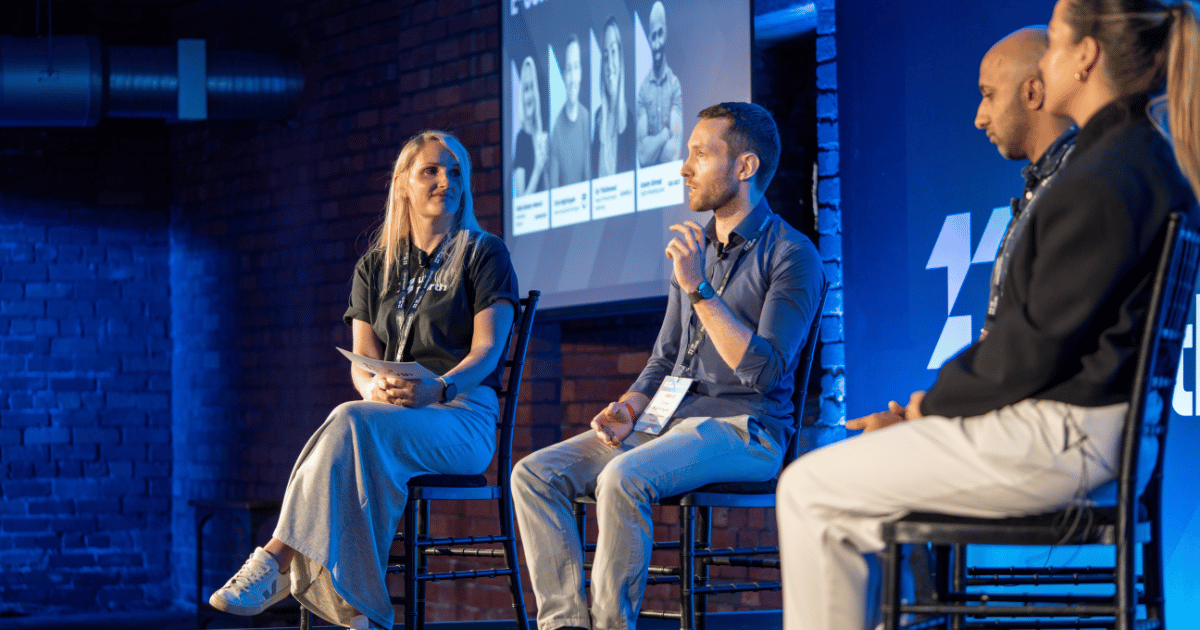Catch up on each session below with talk summaries and access to speaker slides.
We were back in sunny Manchester this June for our third Up North marketing festival – a full day of networking, industry insights and standout talks, all wrapped up with an Aperol Spritz after party.
After months of planning, curating an agenda with 32 incredible speakers, partnering with 9 brilliant sponsors, and selling out for the third year running with 400 attendees, we couldn’t be prouder of what we brought to Manchester.
When we first launched Up North in 2023, it was important to us that we created something a little bit different. That’s why our focus has always been on the speakers, the agenda and our amazing venue!
A huge thank you to our sponsors Print.com, Ahrefs, Generation Digital, You Platforms, Passata, Girls in Marketing, Pedagogue, Powerhouse, GIFTA and of course to all our attendees and speakers for joining us.
You can view the event photography here – photo cred to Rebekah Middleton and C3’s Ryan Colleran.
Stage one
Broghan Smith – Head of Fashion & Beauty New Business, TikTok
Talk: TikTok Shop: Unlocking discovery commerce
Broghan Smith spoke about his work at the UK’s fastest growing e-commerce platform. With roughly half of the UK population actively using TikTok, and with the typical user spending two hours on the app every day, TikTok Shop has innovated on digital sales with an approach Smith calls “discovery commerce”. This means that creators can speak about a product authentically, show the user a real life application, and present a fully integrated customer journey that all takes place through one app in about 30 seconds. He also discussed TikTok’s rising prominence as a search engine, and the importance of connecting with customers who could wind up becoming your business’ next brand advocate or content creator.
Naomi Horan – Social Media and Influencer Manager, Cloud Nine
Talk: More than just a buzzword: Building real community through organic social
Social media manager Naomi Horan’s fireside chat with C3’s Molly Bartram focused on the importance of community in influencer marketing, and how harbouring an authentic partnership with your creators makes your content feel less transactional and more tailored to your audience. Forming a two-way collaborative process with influencers to create content that their viewers want to see allows for natural marketing, as opposed to campaigns where a creator’s audience has little crossover with a brand’s target demographic. As social media marketing shifts away from mainstay campaign frameworks like the “influencer trip” towards more innovative community events and brand collaborations, long term community-building is becoming the foundation of sustained success. By using your available metrics to see how much your audience values your content, you can inform your brand’s decisions and experiment with new content to avoid stagnation.
Tom Higgins – Co-Founder & CEO, GIFTA, Natasha Greenwood – Digital Community Executive, Haier, Molly Bartram, Senior Influencer Marketing Manager, Connective3
Talk: The new realities of influencer marketing
Tom Higgins and Natasha Greenwood sat down with Molly Bartram to discuss changes in social media marketing, where more authentic, relatable content is now taking priority over mid-tier macro campaigns with contracted partners. Audiences can sense when a partnership is purely transactional, so trust needs to be built in the influencer space with creators who have a genuine appreciation for a company’s products. They discussed the importance of data collection and collaboration in tailoring campaigns to specific audiences to achieve the best possible results, and how putting products in the hands of smaller creators can create a word-of-mouth buzz rather than manufactured interests from larger accounts.
Stef Sword-Williams – Founder, F*ck Being Humble
Talk: F*ck being humble: Be brave and leave a legacy
Our keynote speaker for the day was Stef Sword-Williams, a brand consultant and author of “F*ck Being Humble: Why Self Promotion Isn’t A Dirty Word”. She encouraged the audience to stand up and promote themselves, not through arrogance or ego, but an understanding that their voice is powerful and valued more than we may think.
Her talk discussed how marketing has become homogenised and dull, refusing to address important issues such as women’s safety, workplace equality, affordable mental health counselling, and more through two key ideas: creativity and courage.
By standing out and using your influence to leave a legacy that you can be proud of, you can be indispensable in the workplace and avoid losing your spot to AI or another marketer. She encouraged listeners to ditch their FOSS (Fear Of Sounding Stupid), and replace it with FOBG (Fear Of Being Generic), and to continue their passions separately from their line of work even if an idea is rejected by higher-ups.
Martha Evans – Creative Producer & Social Media Manager and Shannon Royal – Creative Producer, Sidemen Entertainment
Talk: Two girls who don’t know the offside rule: Becoming a master of your audience
Martha Evans and Shannon Royal shared how deep audience engagement can outweigh subject‑matter expertise. Tasked with running social strategy for the Sidemen’s 90‑thousand‑seat YouTube Charity Football Match, they openly “didn’t know the offside rule,” yet turned that outsider status into an advantage. Their core goal was conversation, not just reach: include everyone, spark story‑driven chatter, and be first to surface the moments fans would clip and remix. Rejecting rigid content calendars, they ideate on the fly, tailoring tone and format for each segment of their 16‑25 demographic and transforming trends, like the Grammy “sign‑the‑camera” trend on TikTok, into unique “Sidemen hero moments”.
The pair stressed that originality beats tick-boxing, as well as posting with purpose, evolving trends rather than copy‑and‑paste, and crafting narratives that fans can own. Knowing your audience “better than yourself,” they argued, lets you market an event (even a football match) without needing to be a complete expert in the particular field. Their takeaway: embrace creative intuition, stay agile, and always prioritise what will get people talking.
Nicola Gunby – Founder & CMO, CLIQ
Talk: The power of purpose: Building community in tech as a female founder
Nicola Gunby shared her journey from having no prior tech or business background to building a thriving app centred around real-life community connections. Initially launching with just a few features, she emphasised the value of starting small and learning through mistakes, never repeating the same one twice. She detailed how CLIQ filled a market gap by creating a unified platform for people seeking to meet others offline, particularly professionals. Long before “community” became a buzzword, CLIQ focused on cultivating authentic networks, often led by community organisers who now function like micro-influencers.
George Rawlings – Co-Founder, Thursday
Talk: Thursdays only: Disrupting dating and building a brand that breaks the rules
George Rawlings shared how he and his co-founder disrupted the dating app space by building a brand that thrives on bold ideas and rule-breaking marketing. With no technical background, their journey started with a culture-first mindset – spotting that Thursdays saw a spike in dating activity due to after-work drinks. From there, they built a brand rooted in spontaneity and story, evolving Thursday from an app into a movement that hosts real-life dating events.
George discussed early marketing missteps (like a failed “hump day” LinkedIn stunt) and how those lessons shaped their sharper brand storytelling. Whether over a pint or during a brainstorm, they ideate with narrative in mind, using real user success stories to shape authentic campaigns. Brand partnerships have played a big role too, he offered insights into catching a brand’s attention by being unexpected and culturally relevant.
Stage one – Digital Bites track
Mercy Fulani – Freelancer
Talk: Once upon a time, your content flopped
Mercy Fulani tackled the all-too-familiar feeling of content falling flat after launch, and what to do next. She highlighted how easy it is to banish underperforming work to the abyss, but stressed that quality content deserves a second chance. Backed by the stat that 60% of marketers see better results from repurposed content, she shared a personal story: a lifestyle video she made for a client that initially pulled in just 1,670 views. By updating the caption, thumbnail, hashtags, and keywords and digging deeper into her audience, she eventually pushed the video past 21,000 views.
She emphasised the importance of reviewing analytics (like drop-off points), trying different platforms (e.g. using Reels for travel content), and switching up formats (video vs. stills).
Fiona Robinson – Country Caption UK and Cadie Mayor, Co-Creator, Print.com
Talk: CTRL+P for impact
Fiona Robinson and Cadie Mayor explored how blending print and digital (what they called phygital) can create more impactful campaigns. While often seen as old-fashioned, print remains one of the most trusted media formats, with 71% of people completely trusting the mail they receive. They argued that print’s credibility, permanence, and personal feel make it a powerful brand tool, whether it’s a flyer, tote bag or even a water bottle.
Using examples like Toolstation (which used printed QR codes on tools to drive digital traffic, boosting website visits by 10% and saving £1 million) and Coca-Cola (which turned personalised packaging into real-world event experiences), they demonstrated how physical media can reinforce digital efforts. Scientific studies back this up, with multi-sensory experiences, like Royal Mail’s chocolate letter campaign, known to activate more areas of the brain, making the brand more memorable.
Download Fiona and Cadie’s slides here
Tom Baker – Founder, FordeBaker
Talk: Borderless growth: Navigating international expansion through marketplaces
Tom Baker discussed the evolving European marketplace landscape and how brands can strategically expand internationally. Amazon dominates across Europe (especially in Germany, France, and Spain) while TikTok Shop, despite only launching in the UK in 2023, is growing at an unprecedented pace, achieving in a few years what took Amazon over a decade.
For brands looking to scale across borders, marketplaces offer a faster, lower-cost, and lower-risk route compared to launching a standalone website, though they come with trade-offs. Marketplaces provide a ready-made audience but limit marketing control, while your own site gives you customer data and multichannel potential but requires significant infrastructure and payment setup.
Ben Martin – Partnerships Manager, Powerhouse
Talk: AI visuals: Wow your customer, don’t weird them out
Ben Martin explored the growing use of generative AI in marketing visuals, with 89% of marketers now using AI tools and 62% employing them specifically to create imagery. However, consumer trust hasn’t kept pace as 56% believe brands rely too heavily on AI, risking their credibility.
Ben warned that while AI offers speed and savings, it’s not yet visually accurate or trustworthy enough to replace human input. He showed real-world examples of AI visual failures, stressing that brand trust is hard-won and easily lost.
Highlighting ethical and effective AI use, he shared a campaign from Powerhouse for Avon, where real foreground images were combined with AI-generated backgrounds using virtual production. This saved time and costs while preserving authenticity, showing how AI can enhance, not replace, real photography. They even layered in AI-driven motion, sound, and calls to action without compromising brand integrity.
Sophie Smith – Content Writer, Look Fantastic
Talk: In my revenue era: How Taylor Swift helped me make $200k
Sophie Smith shared how cultural relevance (and a little Taylor Swift magic) helped her drive $200k in revenue through clever copywriting and timing. With six years of experience under her belt, Sophie broke down how she capitalised on the Eras Tour’s cultural wave to position Nasty Gal as the go-to brand for concert looks.
The results were a 68% revenue spike, more than 7,000 daily organic visitors, and top rankings for over 300 search terms. But she didn’t stop there. Weekly content updates and fast reactions to product changes (like out-of-stock items) ensured ongoing relevance.
Sophie’s key takeaway was “When Taylor Swift gives you an inch, run a mile.” Staying culturally aware, nimble, and SEO-savvy is what keeps
Karl Randay – Experience Director, 383 Project
Talk: How to uncover hidden opportunities: Using Friction Mapping to take action at pace
Karl Randay shared how friction mapping can uncover hidden opportunities in the customer journey fast. Using a detailed case study with Volkswagen, Karl explained how his team mapped the end-to-end experience of vehicle finance, from research to end-of-contract, to identify and prioritise pain points for innovation.
The goal was to uncover quick wins and drive a long-term cultural shift within the organisation toward customer-centric thinking. Their work resulted in a “North Star” strategy grounded in real customer insight, helping Volkswagen align internally and take action more confidently.
Karl walked through the friction mapping process, stressing it’s not rocket science, it’s about talking to people and understanding their lived experience. Though the pandemic made in-home visits difficult, the team scaled up remote studies to avoid bias and maintain integrity.
Alicia Torres – Senior Marketing Manager, Force24
Talk: Making the inbox hit like Instagram
Alicia Torres encouraged marketers to stop treating email like an afterthought and start thinking about it the same way they do social media. She argued that email isn’t a static channel, it’s a visual, interactive space that should compete for attention just like any social feed.
Alicia reminded the audience that consumers scroll the equivalent of the Statue of Liberty’s height each day, so email has to work harder to grab attention. Instead of viewing social and email as separate or competing platforms, she advocated for treating them as a power duo, with learnings from one informing the other.
Stage two
Tom Lanaway – Innovation Strategy Manager, Connective3
Talk: AI: The magic and the machine
Tom Lanaway explored how AI has moved beyond hype to become a powerful “magic” that helps people do more with less effort. Drawing on lessons from building Merlin, Connective3’s internal AI, he shared practical advice on spotting real AI opportunities, persuading stakeholders to invest, and creating AI solutions that empower teams rather than replace them. His talk emphasised turning AI into a dynamic teammate and encouraged attendees to integrate it into their daily work.
Kate Manton – Coach & Mentor – Baobab Works Ltd
Talk: Embracing disruption, through AI, team and you
Kate Manton explored how true disruption today comes from a powerful combination of AI, self-leadership and teamwork. With AI now an essential, unbiased team member, the talk emphasised embracing it as a collaborator that drives better performance and decision-making rather than a competitor. Yet, by challenging conventional thinking and reimagining team dynamics, listeners were inspired to harness the synergy between human creativity and AI, unlocking new levels of innovation and impact in today’s fast-evolving marketing landscape.
Andreas Stefanou – YouTube Product Lead, Google
Talk: There’s only one YouTube: Where creative brilliance meets Google AI
Andreas Stefanou explored how brands can unlock YouTube’s full potential by combining creative excellence with the power of Google AI. He demonstrated how AI-driven tools help deliver full-funnel strategies, from awareness to conversion, by optimising creative, media, and measurement in one seamless ecosystem.
With short-form video on the rise and YouTube Shorts growing rapidly across screens, Andreas highlighted that today’s users are engaging with content in more ways than ever, making it vital for brands to meet them where they are. He also introduced the ABCD framework (Attention, Branding, Connection, Direction) for building standout creative, and shared how partnerships with creators can boost conversions and trust.
Claire Stanley-Manock – Chief Growth Officer, Connective3
Talk: Beyond the click: Building brands that drive real growth
In an era dominated by AI, ROAS metrics, and zero-click searches, Claire’s talk highlighted why building a strong brand remains your ultimate unfair advantage. Moving beyond last-click attribution, it focused on strategies to unlock sustainable, long-term growth by creating memorable brands that resonate with audiences, without compromising on immediate performance. The audience learned how to balance brand-building with data-driven results, ensuring their marketing efforts drive both recognition and real business impact.
Holly Watson – Head of Marketing, Co-Op Live and Adam MacDonald – Commercial Publishing Lead, NewsUK
Talk: Cutting through the noise: Media, talent and storytelling in a saturated world
In this panel, Holly Watson and Adam MacDonald explored how entertainment and culture intersect in a fast-moving digital world. Though their roles differ, they both face the challenge of cutting through noise to reach passionate, media-savvy audiences. They discussed how they prepare for high-profile events, collaborate with talent, and use storytelling to create standout moments.
The conversation touched on adapting to a mobile-first audience, the shifting definition of success in social media, and what the future holds for live entertainment and digital content, with both Holly and Adam spotlighting the rise of immersive experiences and new formats as key trends.
Perla Bloom – Senior Comms Planning Manager, Expedia Group
Talk: Audience, innovation & entertainment: What modern comms needs right now
In a fireside chat with C3’s Rosa Mitchell, Perla Bloom unpacked what modern communications really demands: audience-first thinking, space for innovation, and a bold embrace of entertainment-led storytelling. She shared how the strongest campaigns begin with a clear strategy rooted in audience insight – not just understanding who people are, but what they care about and how they connect with culture.
Perla emphasised the importance of creating room for experimentation within budgets and team culture, encouraging brands to treat failure as a pathway to innovation. As more brands shift toward storytelling that feels like entertainment, she highlighted that this isn’t just a trend, it’s how culture moves, and brands that adapt will build deeper, longer-lasting connections.
Gus Pelogia – Senior SEO Product Manager, Indeed
Talk: Why you need to trust your marketing data (and how to get there)
Gus Pelogia delivered a session on the importance of crafting an SEO roadmap that actually drives business impact not just busywork. His central message was cut through the noise and focus on what really moves the needle.
Too often, SEO teams get distracted by shiny tasks that don’t tie to real KPIs. Instead, Gus urges SEOs to zoom out: think in terms of projects, not tasks, and build a roadmap around big themes with measurable outcomes. Each initiative should be backed by a clear business case, helping you stay focused, justify priorities, and say no to one-off distractions that won’t scale.
Gus also emphasised the value of split testing and measuring causal impact, especially on large websites. For example, what seems like a minor menu redesign could actually be a month-long, cross-functional effort involving UX, SEO, product, sales, and leadership. Without a roadmap and business case in place, you risk losing alignment and momentum.
Dan Morehead – SEO Manager, Channel4
Talk: SEO & PPC: Married at first sight
Dan Morehead explored how SEO and PPC can be perfectly aligned not competing, but complementing each other. Using the backdrop of the ever-evolving TV streaming landscape, including ITV Hub’s rebrand to ITVX and Channel 4’s own platform overhaul, the talk highlighted how search strategy must adapt with brand evolution.
Channel 4’s recent rebrand unified its streaming service under one name but legacy search behaviours persist. Many users still search using terms like 4oD or even Channel 4 iPlayer. Analysis showed that 80% of brand impressions still come from these outdated but familiar search queries. The takeaway from this insight was that if you’re not ranking organically for these terms, you’re missing out regardless of your current branding.
Dan also advises to use a VPN to emulate different locations and AI search behaviours, a smart move when reporting on SERPs visibility and testing search variations in new environments.
Elle Pollicott – Organic Search Director, Connective3
Talk: The SERPs are shifting: Here’s how to evolve your organic strategy with it
Elle focused on the shifting landscape of search and what it means for modern SEO. Her session centred on four key areas: AI Overviews (AIOs), video and social search, organic shopping, and Google’s AI Mode offering a look at how SERPs are transforming and what strategists need to do now.
- AI Overviews (AIOs) Are Reshaping Search
The rise of AI Overviews (AIOs) is changing how users interact with Google and 14% of keywords now return AIO features, jumping to 88% for long-tail keywords. They’re especially prevalent in industries like life sciences, tech, biology, and finance, and month-on-month growth is accelerating fast.
However, AIOs are fuelling zero-click searches meaning your brand needs to be visible inside those results or risk getting cut out entirely.
- Video and Social Search Are Non-Negotiable
With social platforms now being as legitimate as search engines, Elle emphasised mapping video formats, scripting effectively, and tightly aligning with keyword research. Tools like KeywordTool.io and Ahrefs can be used side-by-side for deeper insights.
- Organic Shopping Listings Need SEO Input
As ChatGPT and Google start making AI-powered product recommendations, it’s essential your product pages and feeds are fully optimised. This includes high-quality images, clear titles, competitive pricing and structured data.
- AI Mode & the Future of Search
With Google AI Mode (currently rolling out in the US), the search landscape is becoming hyper-personalised but Elle reassured the room that while this feels overwhelming, it’s also a major opportunity for agile brands.
All in all, Elle’s talk focused on the key takeaway of not losing sight of humans. As AI transforms the SERP, the brands that win will be the ones creating content for people not just algorithms. Strong EEAT signals (expertise, author bios, trust indicators) still matter more than ever.
Gaby Mendes – Co-Founder, Passata and Olivia Hanlon – Founder, Girls in Marketing and Co-Founder, Passata
Talk: People power: How communities build the brands of tomorrow
Gaby and Olivia shared their journey from meeting in 2020 to building thriving, community-led brands. Girls in Marketing (GIM), now a global learning platform and movement, has grown to 20 million social media impressions, partnering with over 60 global and local companies. Gaby also built Talk Twenties from a podcast into a large-scale platform reaching millions.
Their core message of their talk: community isn’t just an add-on, it’s the foundation. Whether it’s the inside jokes or the vulnerable spaces they’ve created, both founders stressed that community means belonging, safety, and shared identity. Community, they argued, is your most powerful marketing strategy, with 64% of consumers wanting brands to connect with them beyond product.
They outlined three key points:
- Community isn’t just followers, it’s the people who would miss you if you disappeared.
- Community is a foundation, not a feature, it supports openness and vulnerability.
- Community is about belonging, it’s where people feel seen, heard, and understood.
Download Gaby and Olivia’s slides here
Helen Hope – Heritage Brand Manager, NBrown
Talk: Magnetic Marketing: The laws of brand attraction
Helen explored how belief, energy, and vision drive brand success just as much as strategy. Using the Stanley Cup trend as an example, she showed that cult brands like Amazon and Lululemon don’t just sell products, they sell belief.
Sharing her personal journey from a struggling shop owner to life-changing success through visualisation, Helen emphasised that belief fuels action, and action builds momentum.
Helen’s magnetic marketing framework follows three steps:
- Clarify the vision
- Align the energy
- Activate the attraction
Ash Jones – Founder, Great Influence, Clair Heaviside – Co-Founder, Serotonin, Rosa Mitchell – Director of Manchester, Connective3
Talk: More than followers: Building a personal brand in 2025
This panel explored what personal branding really means, how it impacts professional growth, and how to build an authentic presence that resonates with the right audience.
Ash Jones emphasised that personal branding should reflect who you are offline, not just your online persona. Micro shifts in language can change who you’re speaking to, so clarity matters. Relevance is more important than reach and going viral only works if there’s meaning behind it. He encourages playing the long game and using AI wisely as building your brand yourself has long-term value.
Clair Heaviside described personal branding as more than ego, it’s how people perceive your purpose. She encouraged treating yourself like a brand: define your values, goals, and what makes you different. Content should offer value and reflect who you are beyond your job title. Use AI as a tool, not a crutch, refinement is key to keeping content meaningful.
Rosa Mitchell spoke openly about imposter syndrome and the importance of self-belief. With over a decade in marketing, she shared that building confidence in your voice takes practice. She recommends keeping evidence of your expertise to remind yourself you’re capable, as personal branding starts with backing yourself.
Event photos
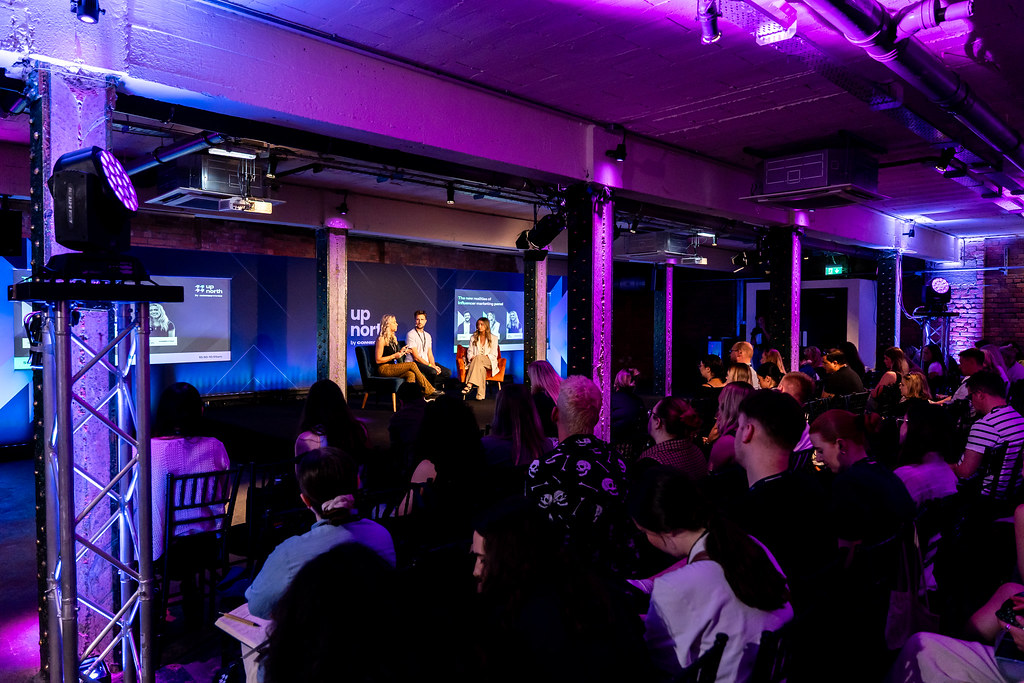
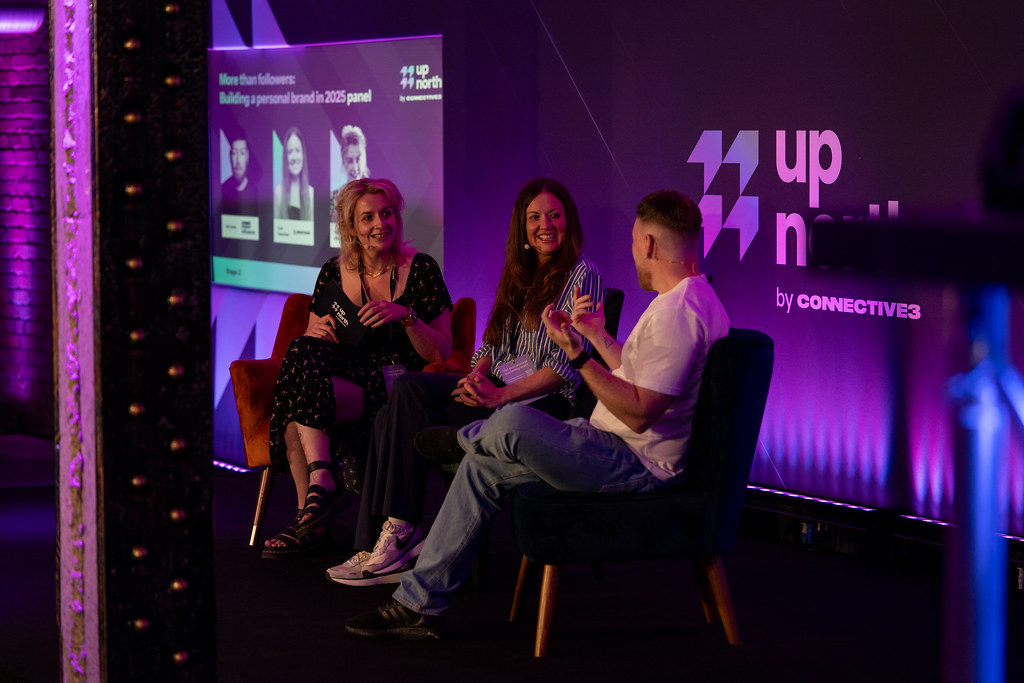

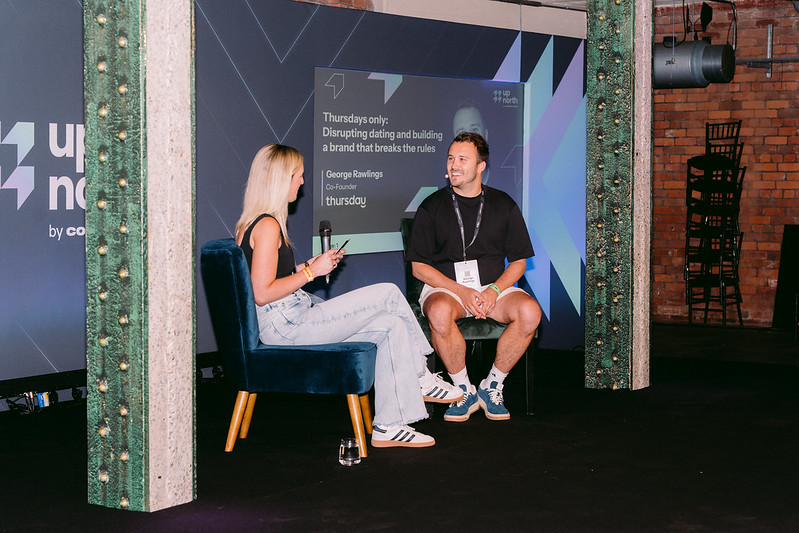
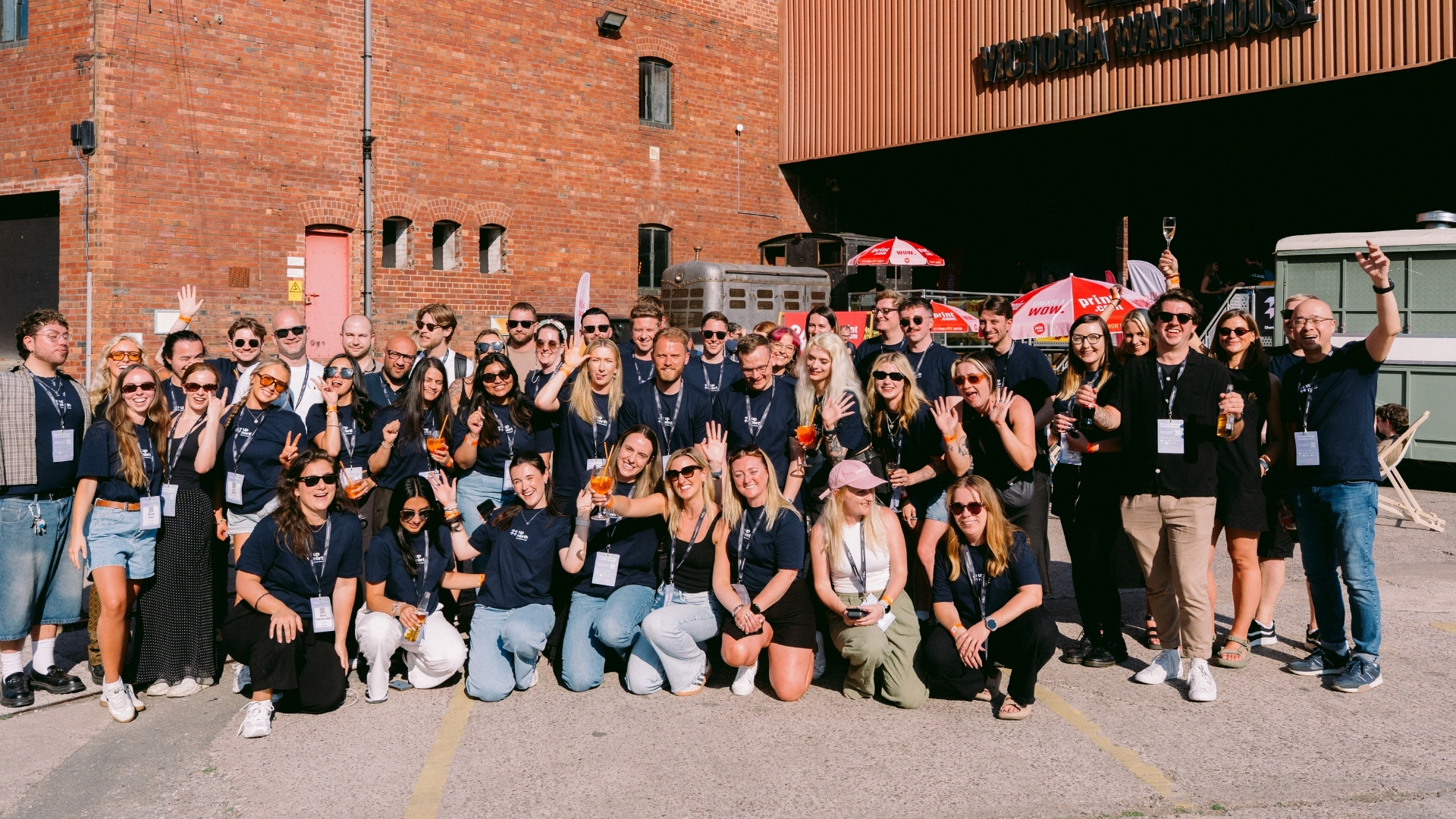



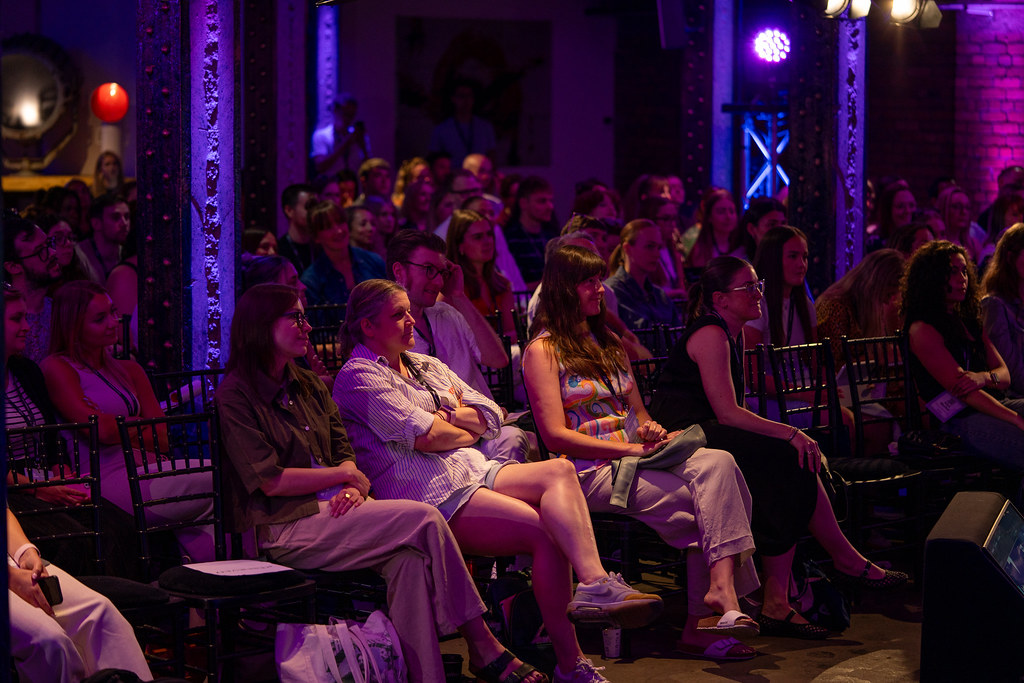
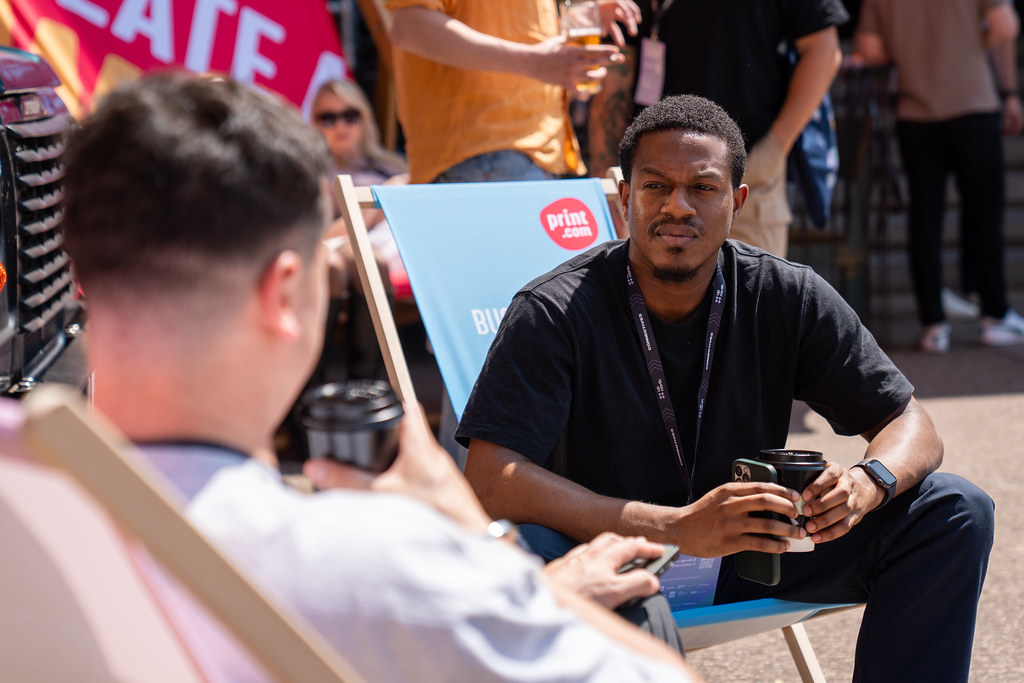
Check out all the event photos here and make sure you’re following us on social to kept in the loop with our latest updates!
Where is Up North?
Up North is being hosted at Victoria Warehouse, Manchester – full details on how to get to us can be found here.
If you’re travelling by tram, the nearest stops are Exchange Quay and Wharfside, both just a short walk from the venue.
Still a bit stuck on how to get there? Check out this video showcasing the route to take from Manchester Piccadilly train station.
Will there be parking?
Yes there is free parking at the venue, there are 100 spaces and it’s first come first served. If you have accessibility requirements please email [email protected]. We encourage the use of public transport where possible!
What is going to be happening at Up North?
Who’s speaking?
We’ve got an agenda JAM PACKED with great talks, panels, fireside chats, and more. You’ll be hearing from F*ck Being Humble, Expedia, Sidemen Entertainment, Co-Op Live, Google, TikTok and more. You can view the full speaker line-up here and full talk overviews and check out the agenda here.
Refreshments and lunch
We’ll have morning pastries and tea & coffee provided by Ahrefs, giving you that all-important brain power for the day ahead! There will be delicious lunch options available to purchase from Victoria Warehouse.
Say hello to our sponsors
Alongside our amazing agenda of talks, there will be lots of networking opportunities throughout the day and you can chat to our sponsors who are exhibiting. There’ll be merch, give-aways, prizes, cookies and stroopwafels from print.com, Powerhouse, GIFTA, Generation Digital , You Platforms, Passata, Girls in Marketing and Pedagogue.
After-party
There’ll be post-event networking drinks from 5-7pm sponsored by Print.com.
There will of course be free wifi on the day. The password for this is Connective3. However with 400 people trying to access the network, it may be a little slower than expected at times, so please bear with us.
Not sure what to expect? Check out the behind-the-scenes vlog from Up North 2023:
Timings
Last and most importantly, the when – join us on Thursday 19th June at Victoria Warehouse, doors open at 8.30am with talks kicking off at 9.30am. With delicious lunch onsite, networking, and an after-party, we’d love to host you right up until the conference closes at 7pm.
We’ll see you there!
For any additional information, please check out our FAQs.
Last Thursday, we hosted our final Digital Bites event of 2024 at one of our favourite venues, the Everyman Cinema in Manchester. A huge thank you to all our attendees and speakers for joining us and making it a memorable day. Since launching Digital Bites in 2021, we’ve loved bringing marketers from the North together for afternoons filled with actionable strategies, expert insights, and networking – we’re looking forward to being back in 2025!
Ellie Kime – Founder, Eleanor Mollie/The Enthusiast & Co
Talk: Showing off your yoU-SP
Ellie shared her insights on blending personality and professionalism in business. She emphasised that a brand doesn’t need to be entirely formal – bringing out personality can enhance relatability.
One key point Ellie highlighted was celebrating your team, recognising them as a valuable asset. She reminded us that understanding the power of your team can truly elevate a business.
Another tip was to avoid neglecting the ‘About’ page. These pages often get significant visits, so making them personable rather than filled with company jargon can make a big difference. Ellie also encouraged brands to have fun—keeping up the vibes and energy is essential.
View Ellie’s slides here
Chris Nightingale – Director, Can-Do Digital
Talk: From Standout to Startup: The lessons learnt from leaving a giant retailer and starting my own marketing company
Chris, who recently moved from AO to freelancing, shared his journey of launching Can-Do Marketing and building his personal brand. His journey taught him the importance of adapting to new roles and skills, as he now manages all aspects of his business.
Chris emphasised the importance of positioning yourself as the unique puzzle piece your clients need. He shared how essential networking, collaboration, and expanding your network is in today’s freelance world. He also discussed the distinction between strategic and tactical roles, noting that a manager takes a strategic view, while an exec or assistant executes tasks.
He also touched on the rise of AI, citing tools like True Clicks for PPC and ChatGPT as essentials for modern marketers. Chris ended with an important reminder: learning to say both “yes”, but more importantly “no” is key. And also accepting and learning from failures.
View Chris’ slides here
Broghan Smith – Fashion Key Accounts Lead, TikTok Shop
Talk: Social commerce and driving sales through TikTok Shop
Broghan presented on the explosive growth of social commerce, focusing on how TikTok is redefining the shopping experience with its seamless customer journey.
He discussed TikTok Shop’s design to make the customer journey as frictionless as possible, highlighting four native ways users can explore and purchase:
- Shoppable video: Offers a subtle way to purchase directly from videos.
- Live shopping: Creates an engaging, interactive shopping environment.
- Showcase: Fuses entertainment with shopping, making browsing more enjoyable.
- Shop Tab: Uses algorithms to deliver curated shopping recommendations.
Broghan also discussed how TikTok is opening doors to new audiences and fostering strong community engagement in the social commerce space.
Charlotte Sharpe – Paid Media Team Lead, Connective3
Talk: Leveraging behavioural science to power international paid strategies
Charlotte Sharpe, the Paid Media Team Lead at Connective3, brings over four years of experience in the paid media field. In her talk, she explored how behavioural science can enhance paid media strategies and addressed some of the current challenges facing the industry.
With CPCs continuing to rise (+10%) and conversion paths becoming increasingly complex, reaching customers requires navigating multiple touch points. Increased brand competition across markets gives customers more options than ever before. However, Charlotte emphasised that by using data and adopting creative approaches, marketers can still influence performance effectively.
She concluded her talk by discussing the future of paid media and offering insights on how marketers can adapt and thrive in this evolving landscape.
View Charlotte’s slides here
Dan Marshall – Group Head of Digital, Moneypenny
Talk: CRO > Everything else
Dan Marshall, the Group Head of Digital at Moneypenny, has over 12 years of experience in marketing. His talk introduced the fundamentals of Conversion Rate Optimisation (CRO) and highlighted the need to balance various aspects of marketing.
Dan shared three primary examples of CRO in action. First, he demonstrated how live chats can boost conversion rates by 12-20% and weighed the pros and cons of using AI versus human operators. Next, he discussed exit-intent pop-ups, pointing out that the average user spends less than a minute on a website, and showed how pop-ups can help retain visitors. Finally, Dan talked about optimising existing channels and understanding what truly drives value online.
Ronja Ostner – Senior Digital PR Executive, Connective3
Talk: Unlocking EU markets: The native insight advantage
With a background in social media and influencer management, Ronja Ostner transitioned into digital PR over 18 months ago and has since played a crucial role in link building across German-speaking markets.
Ronja’s talk provided an overview of the EU market and underscored the importance of native language proficiency for establishing authority and achieving “local” relevance.
In the second part of her talk, she covered the do’s and don’ts of EU link building. Key recommendations included researching the media landscape, engaging with journalists, and exploring newsjacking opportunities.
She concluded by cautioning against common pitfalls, such as expecting instant results or making direct comparisons to the UK market, as these can lead to frustration and early abandonment of EU campaigns.
View Ronja’s slides here
Andriy Starukh – Head of SEO, Iglu Cruise
Talk: Data overload? Practical strategies for managing SEO data for mid-size enterprises
Andriy is the Head of SEO at the UK’s largest independent cruise and ski agency. His talk centred on how to avoid data overload, and ways to manage SEO data at an enterprise scale.
He began his talk by sharing that enterprises are companies that have an annual revenue range of up to $10 million – over $1 billion. Andriy talked to the audience about the challenges of working with enterprises such as security concerns, change resistance and competition. He shared the model of why, how and what. Why is to feel less stressed and become more confident as an SEO, how is by using the right tools and automation and what is to track the right metrics. He advised to review your process at least every quarter for better clarity and context.
Andriy shared the five-step process that can help you make better decisions:
- Categorise queries and pages into groups
- Track each group’s performance
- Check keyword distribution by position
- Monitor events such as core updates
- Blend multiple data sources
Lizzie Lewington – Head of SEO Strategy, Connective3
Talk: Why GEO is the new SEO, and how to master it
Lizzie shared insight on how the AI overview will kill SEO due to various the changes taking place. According to Lizzie, the AI overview does pose issues such as pushing regular search results down yet holds opportunities such as driving more clicks through to site.
She discussed the point that SEO’s need to adapt to keep up with the evolution. For example, from 2014 to present, we’ve seen the unveiling of featured snippets, product listings and continuous scroll, all of which have improved the user experience.
Lizzie went on to explain how we can get better at generative SEO, through tactics such as picking the right keywords which trigger AI overviews, ‘Ai is improving and learning through different interactions.’ She confirmed that being unique is key, and we need to provide content which matches the query intent and is reliable, so Google chooses you over competition.
Lizzie finished her session by sharing how to optimise product feeds and use enchased schema mark up for shopping with the audience.
View Lizzie’s slides here
Mercy Fulani – Marketing Executive, GatenbySanderson
Talk: It starts with a like
Mercy is a Marketing Executive at GatenbySanderson and her talk focused on the importance of taking content creation further than a like, and the importance of knowing who you are speaking to.
Mercy shared her personal story of running with a content idea without conducting in depth research of her audience’s behaviour. The content did not yield the results she anticipated as she admitted that she didn’t know anything about who she was creating for and ended up teasing a service which no-one had knowledge about.
According to Mercy, the most important factor is, ‘who are you speaking to, where do they go and what do they do’. She spoke about the best way to gain audience information, through the likes of competitor analysis, asking your core audience directly and platforms such as Reddit. Mercy’s key points to taking your audience relationship beyond the like are:
- Clarify who are you speaking to and keep messaging consistent
- Share why they should want you – share the problems you can solve
- Diversify content – short form videos are growing
- Tell a story to build deeper, lasting connections
- Be for real – authenticity can help you reach people
View Mercy’s slides here
Molly Bartram – Senior Influencer Marketing Manager, Connective3
Talk: The key to cross-generational influencer marketing
Molly began her talk by discussing that authenticity is not enough, people need great content to convert. She explained that trust is built differently across generations, and no campaign is the same. Molly believes that there is never a one size fits all model for cross-generational influencer marketing and went on to explain the platforms each generation uses the most.
She stated that Gen Z are more loyal than other generations and Millennials respond well to video content, but they are open to social content too. An important factor Molly said brands need to note is that ‘Gen X are everywhere; they don’t focus on one platform’.
She shared her insights into generation cohorts and purchase behaviour between them, a wider consensus is that consumers are trusting influencers more than A-list celebrities, and brands need to adapt and use them in campaigns if they’re not already. Molly went onto outline the key messaging for each generation:
- Gen Z like to see the good and bad, genuine content wins over scripts, so influencer briefs should be loose to let the creator lead.
- Millennials respond well to reviews, product demonstrations and discount codes.
- Gen X are price sensitive and prefer nostalgic content.
Molly finished with the underlying messaging that campaign messaging should not change between generations, the key is to keep it simple.
View Molly’s slides here
Chris Hockin – Director, Business Development, The Trade Desk
Talk: The future of retail explained
Chris began his talk by covering what retail media is – a focus on targeting actual human shoppers by identifying and engaging with the real people behind purchasing decisions. By focusing on real shoppers, retail data allows for refined targeting based on:
- Purchase behaviour
- Product category preferences
- Competitors’ customers
- Lapsed shoppers
- Customer life stage
Chris covered how retail data empowers brands to connect with highly engaged, relevant audiences in real-time and by using controlled activation solutions, brands can reach across various segments—categories, competitors, lapsed shoppers, lifestage, etc. Chris’ session finished with the statement that retail data consistently outperforms other data strategies, showing higher engagement and relevance, further showing its significance.
View Chris’ slides here
Tom Higgins – Co-founder, GIFTA
Talk: Cutting through the noise: How strategic influencer gifting at scale strengthens brands
After starting GIFTA as a passion project, Tom is the Co-founder of GIFTA, an influencer gifting business which has worked with brands such as Dove, Adidas and New Balance.
Before GIFTA, Tom was an influencer and after experiencing brands reaching out for gifting opportunities with restrictive demands, he was inspired to start GIFTA. Through GIFTA’s alternative approach to gifting, they have a success rate of 92% of products gifted, being posted by influencers which is a significant increase from typical rates of 10-20%. Tom delved into why gifting works as consumers value social media recommendations and authentic and real content that resonates with the audiences.
To finish off, Tom shared a case study of the work GIFTA did with Dove where they worked with 1,500 influencers on a gifting basis and from this they achieved 3.7 million impressions and 151,000 engagements, demonstrating the impact of gifting.
View Tom’s slides here
Ben Martin – Partnership Manager, Powerhouse Studios
Talk: Gen-AI & Virtual Production – Using emerging technologies to level up your visual content
Ben Martin, Partnership Manager at Powerhouse Studios began by talking about how although AI has existed since the 1950s but recent generative AI developments have raised concerns about replacing creative roles, especially in photography with it being most effective for backgrounds and environments, not final products.
Ben covered that virtual production was originally used in films however has now become a powerful take in advertising. Virtual production is ideal for:
- Impossible or environmentally challenging locations
- CGI replacements, which can be costly and resource-intensive
- Transparent or reflective products, where controlled conditions matter
- Saving time and budgets, allowing for “multi-location” shoots in one place
Ben explained how generative AI is a tool, not a replacement, but it can be used to handle costly elements, freeing up budget to focus on authentic product shots. The audience were left with the key takeaway to embrace new technologies to tackle creative challenges, but retain brand authenticity by balancing AI with traditional processes.
View Ben’s slides here
Check out the event photos here and make sure you’re following us on social to kept in the loop with our latest updates!
Designed to create a level playing field for businesses of all sizes the Digital Markets Act (DMA) seeks to regulate the digital gatekeepers to ensure fair competition in the digital space.
In September, the European Commission officially designated the first six gatekeepers as Alphabet, Amazon, Apple, ByteDance, Meta & Microsoft with further announced in October. These companies have a grace period to comply with the act and enforcement will take place from 6th March 2024.
What does the Digital Markets Act mean for Google?
To comply with the DMA, Google is making a number of changes to its products and services with all Google measurement technologies requiring valid user consent.
This applies to anyone with users in the EEA whether or not the advertiser is based there. Advertisers who send unconsented data to Google may face enforcement action, such as data deletion, account disablement, functionality restrictions and more.
As part of compliance efforts, Google recently indicated that advertisers who do not have a basic Consent Mode implementation by 6th March 2024 will have bidding and remarketing suspended.
How does Consent Mode work?
Google’s Consent Mode adjusts measurement technology behaviour based on a user’s consent choices. This allows advertisers to convert signals in a privacy-safe way to recover attribution lost by consent choices.
Using a CMP, advertisers can configure consent categories which is used by Google Consent Mode. From the user’s perspective, this is a series of toggles or checkboxes to enable consent for specific categories. Where relevant consent is provided measurement can function as intended.
If consent is not given, anonymous signals without personal identifiers will be collected as measurement behaviour is modified. This allows you to capture events in a privacy-safe way without the ability to understand an individual’s journey. These events are used by Google to model conversion data and recover some of the lost attribution caused by consent choices.
In its ideal state, Google Consent Mode utilises both consented and unconsented hits to perform this modelling. However, only a basic implementation with consented hits is required before 6th March 2024 to maintain advertising.
There are various methods for the implementation of consent mode, if you think you need support or to act on the recent announcements get in touch with our team who have been supporting our clients with consent management and the implementation of Google Consent Mode.
If you have a CMP. You will lose data from users who do not consent to using cookies. Conversions will reduce and optimisation performance will worsen. Consent mode modelling helps fill the gaps with machine learning algorithms. In fact, Google Consent mode has been shown to recover 70% of reported conversion losses.

What does this mean for advertisers?
- Advertisers will need a functional consent management platform (CMP) on their digital properties allowing users to determine their consent choices.
- As a minimum requirement, advertisers will need to implement a basic set-up of Google Consent Mode in order to pass valid consent identifiers to Google. CMPs such as CookieBot or OneTrust have integration with Google Consent Mode.
- For advertisers still using Google’s Universal Analytics, a migration to GA4 will be necessary to maintain services such as audience and conversion export to Google Ads. So, 360 accounts will need to move.
- Advertisers will also need to update to the latest versions of API/SDK’s for Google Ads and DV360.
Hopefully, you now know more about what DMA will mean for advertisers, and how the act will mean changes to Google’s products and services. To check out more news and insights, check out our blogs, or visit the Data Analytics Team’s page to learn more about what they do. Alternatively, you can check out our LinkedIn to catch up-to-date news and insights.
We were back at Victoria Warehouse, Manchester in June for our second Up North marketing festival where we were joined by 430 attendees, 30 speakers and 5 sponsors for a day to remember. Huge thanks to our headline sponsor Funnel and our secondary sponsors SISTRIX, Tall, STAT Search Analytics, Girls in Marketing and of course to all our attendees and speakers for joining us.
Experience the vibrant atmosphere of the day and hear memorable sound bites from some of our incredible speakers, sponsors, and C3 team in our showreel.
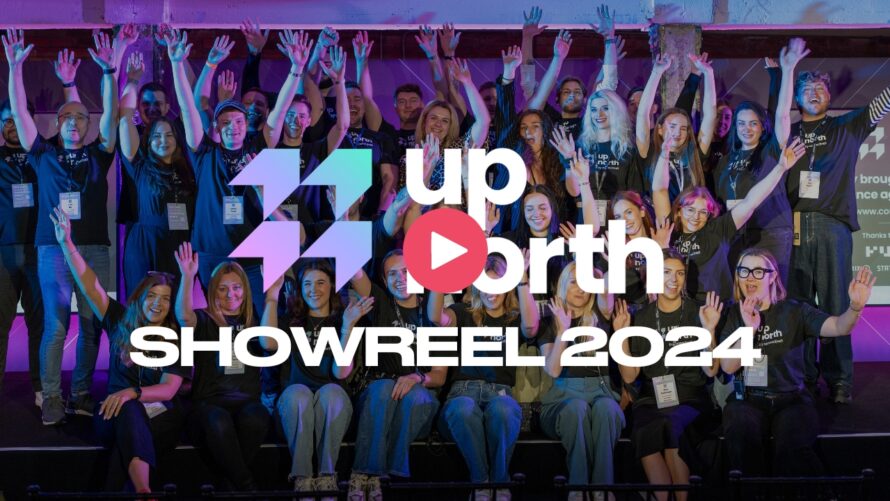
Stage one
Ben Gallagher – Founder, Luxe Collective
Talk: How to properly understand social media in less than 30 minutes
Ben Gallagher from Luxe Collective emphasised the complexity of understanding social media despite having posted thousands of videos and amassed billions of views and millions of followers himself. The first step is acknowledging one’s limited understanding of social media. Gallagher advised overcoming the fear of posting by realising that other people’s opinions are often irrelevant and suggests consistently posting to build confidence. The second part to understanding is volume and he stressed the importance of volume over perfection, comparing social media to a language that requires practice and repetition to master. Gallagher’s framework for success is why, what, how and includes defining the purpose of your brand on social media, determining the content type, and utilising various delivery methods and structures to engage the audience. His framework involves creating content that makes viewers stop, stay, and act, refined through continuous analysis and adaptation.
Charl Geoghegan – Head of Brand Marketing, REFY
Talk: The power of people & the new era of influence
Charl Geoghegan from REFY highlighted the significance of people and the evolving landscape of influence in social media, particularly noting the brand’s success as fully female-founded and funded. She favours celebrity influencers but acknowledges the broadening scope of influence, where platforms like TikTok enable anyone to have an impact. Geoghegan emphasised the powerful effect influencers can have on sales, citing substantial increases in product sales due to influencer promotions, such as a 107% rise in brush sales on the site (DTC) and an 850% uplift in mascara sales at Sephora following promotion from Bronwyn a REFY customer turned influencer with 10k followers. She underscored the shift from traditional influencers to customer advocacy, noting that 92% of people trust recommendations over advertising. With trust being crucial, she advocates for focusing marketing efforts on genuine customer interactions. Simple, resonant content and aligning paid and organic social strategies are key, while leveraging social media as a cost-effective channel. Geoghegan also championed the importance of customer experiences, incentives, and recognising loyal customers to foster a reciprocal relationship and drive recommendations.
Sonia Hussain – Brand Manager, Lounge Underwear
Talk: Why brand building matters now more than ever
Sonia Hussain from Lounge Underwear discussed the critical importance of brand building, especially in today’s market. She distinguished between a business, which focuses on functionality and the bottom line, and a brand, which is the reason customers choose you. Hussain identifies three key pillars: purpose, position, and personality. Purpose involves adding value and having a long-term vision; position requires understanding market challenges and defining a unique selling proposition; personality encompasses messaging, tone, and visual identity. Building a brand involves communicating these pillars, reaching new customers, and maintaining brand awareness and salience. She highlights successful examples like REFY and Gymshark Women, which tap into micro-communities and prioritise authentic, eye-catching experiences. Hussain advised starting with a modest budget, embracing data, planning both large campaigns and smaller sustaining efforts, and consistently telling the brand story to entertain, educate, or inspire. She stressed the need to remain agile, continuously learn, and be the brand’s advocate within the business, despite performance marketing often taking precedence.
Will Brittain – Head of Social, Connective3
Talk: Code red the 7 paid social test you can’t afford not to run
Will explained that in the evolving landscape of paid social media, it’s essential to run 15 different experiments annually within Meta, introducing a new test every 3-4 weeks. This involves seven key tests divided into four practical and three strategic categories. Practical tests include multicell placement and format testing to avoid oversimplified A/B results, utilising more text in assets due to relaxed meta rules, multi-cell bid strategy testing post-iOS14 for performance maximisation, and using engaging visuals through the “Pope in the Pool” technique focusing on user-generated content. Strategic tests involve measuring search lift to demonstrate the value of Meta ads, using profit steering signals for competitive advantage, and leveraging organic social media as a testing ground to refine paid content strategies based on audience feedback.
Elle-Louise Wilmot – Founder, Truly Twenties
Talk: How to supercharge your career through creativity, community and connection
Elle-Louise Wilmot from Truly Twenties delved into the transformative power of social media for career advancement, illustrating her journey from feeling stuck in nuclear energy to leveraging TikTok to showcase her skills creatively. She explained how she created a compelling online CV through a dedicated TikTok channel and utilised social media trends to land her dream role at TikTok. She explained how this helped her standout in a saturated market but understands how this approach can be time consuming and should be reserved for your dream roles. Wilmot highlighted why you should target specific brands, understand the subjective nature of creative ideas, and not strive for perfection. She underscored the value of networking, which can be time-consuming but ultimately crucial, suggesting that redundancy can serve as a redirection rather than a setback. Emphasising creativity, community, and connection, Wilmot advocates for building a strong network, as it can eliminate the need to apply for roles and significantly bolster one’s career.
Broghan Smith – Fashion Retail Key Account Lead, TikTok Shop
Talk: An introduction to TikTok shop
Broghan Smith introduced TikTok Shop, showcasing the platform’s massive reach with 1.8 billion monthly users and its significant impact on e-commerce. With over half the population engaging with the app daily and the UK being the third-largest e-commerce market, TikTok is revolutionising shopping. Social commerce is thriving, with 80% of participants likely to buy during live sessions, and the hashtag #tiktokmademebuyit has amassed 86 billion views. TikTok Shop combines entertainment with shopping in a seamless, closed-loop ecosystem that keeps consumers engaged from discovery to purchase. Users can shop through live sessions and creator collaborations. Looking ahead to 2024, TikTok Shop plans to enhance its CRM tool, integrate with Shopify, optimise social search SEO, and expand into new European markets like Ireland and Spain.
Keira Penney – Head of Creative, Girls in Marketing
Talk: Elevating every corner of your career with creativity
Keira from Girls in Marketing, shared practical tips, real-world examples, and actionable strategies to help you unlock your creative potential and transform your career. She explained how boosting your career through creativity is essential, as the more you harness your creativity, the more it grows. Career success is subjective and defined by individual priorities, yet creativity is a common thread in all definitions. Despite a decline in creative thinking since the 1990s, with 75% feeling they haven’t reached their creative potential, leveraging lateral thinking can set you apart. Embracing a framework of adaptation, innovation, connection, and reflection is key. Adaptation involves managing your career development, innovation means rethinking traditional processes, connection expands your network, and reflection assesses your progress. Building a career you love involves autonomy, connectivity, and competence.
Janis Thomas – Managing Director, Look Fabulous Forever
Talk: The value of older consumers in e-commerce
Janis Thomas from Look Fabulous Forever started off her talk by saying that more brands are talking about diversity, but how many still focus on millennials and gen Z? Over 65s are the fastest growing customer group in e-commerce and many have a more secure income than their younger counterparts. Historically, branding focused on exclusivity, but now, branding must evolve to emphasise inclusion and a sense of belonging. Consumers over 50 constitute over 40% of the population, and so accurate representation and understanding where older consumers shop are essential. This demographic spans three generations, and so shouldn’t be shoehorned into ‘the over 50’s’. To get a true representation of this diverse demographic, you should have a tailored approach and continuous feedback through support groups, social listening, Trustpilot, surveys, and behaviour observation. Examples show that including older consumers fosters loyalty, positive feedback, and referrals, highlighting the business benefits of good accessibility and inclusivity.
Women in marketing panel (Q+A)
Connective3’s Rosa Mitchell hosted our first ever women in marketing panel with Olivia Mae Hanlon (Girls in Marketing), Janis Thomas (Look Fabulous Forever), Claire Stanley-Manock (connective3) & Rejoice Ojiaku (Nelson Bostock Unlimited)
The panellists answered specific questions asked by the audience, here’s a summary of what was discussed:
Question: Describe different leadership styles
Collaborative: Emphasising the importance of giving everyone a voice, collaborative management values each individual’s unique contributions. This approach fosters an open and inclusive environment.
Human perspective: By minimising hierarchical structures and prioritising transparency, managers can cultivate innovation and a sense of equality within the team.
Autonomy and leadership: Empowering individuals to take ownership and leadership roles within their tasks encourages a sense of responsibility and growth.
Challenge appropriately: While it’s important to challenge team members to reach their potential, it’s equally important not to push them beyond their limits.
Core values: Honesty, transparency, and collaboration are the foundation to effective management, ensuring trust and collective progress.
Question: How to negotiate pay?
Research thoroughly: Investigate salary ranges using resources like recruitment agency surveys to understand what is reasonable for your role and experience.
Aim high: Begin negotiations with a higher figure that stretches the employer’s expectations, positioning it as your desired salary to give room for compromise.
Long-term Goals: Express your awareness of the role’s pay range and indicate a willingness to compromise initially, with the aim of reaching your target salary over time.
Question: How to measure success?
Small wins: Recognising small achievements, such as learning new skills or making new contacts, is crucial as these incremental successes contribute to the overall success of a business.
Question: How did you decide to build your own business?
Creating impact: The desire to make a significant impact and create meaningful change drives the decision to start a business.
Passion: Passion is essential for overcoming challenges and achieving success in entrepreneurship.
Question: Importance of finding mentors in the industry
Valuable advice: Mentors provide insights and advice that might be unavailable within your direct network, offering broader perspectives.
Community: Being part of a mentorship community connects you with experienced professionals and fosters a supportive network.
Question: Best piece of advice you’ve been given?
Embrace fear: “Feel the fear and do it anyway” encourages taking risks despite uncertainties.
Risk-taking: Being willing to take risks is essential for growth and success.
Authenticity: Staying true to yourself in all your endeavours ensures genuine connections and integrity.
Push boundaries: Always strive to take things as far as you can, challenging limits and seeking continuous improvement.
Itamar Blauer – Senior SEO Director, StudioHawk
Talk: How to unify digital marketing teams
To unify digital marketing teams, Itamar Blauer of StudioHawk emphasises the importance of enhancing communication, noting that 86% of workplace failures are due to poor communication. This can be improved by using shared project management tools, regular check-ins, and communication software. Developing a unified strategy is also crucial; while individuals have their own KPIs, it’s important to identify broader goals that impact the entire business and foster collective achievement. Additionally, leveraging each team member’s skills by assessing capabilities, repurposing content across different channels, and utilising diverse talents effectively can significantly enhance team cohesion and productivity.
Eirini Theodoridou – Digital PR Manager, Connective3
Talk: How to make your campaigns work harder
To make your campaigns more effective, C3’s Eirini Theodoridou suggests starting by asking the right questions: why you are launching the campaign, what interests your customers, gathered through tools like BuzzSumo and social listening platforms such as Linkfluence and Brandwatch, and how you can creatively present your data to tell a compelling story. Additionally, consider when you can reangle the content to align with local awareness days or events, enhancing relevance and engagement.
Azeem Ahmad – Digital Marketing Consultant, Azeem Digital
Talk: Resilience in action – how to move forward during tough times
Azeem Ahmad highlighted key strategies for building resilience during tough times, including establishing a robust support system, practicing self-compassion, and prioritising relationships with loved ones. Additionally, don’t hesitate to ask for help when needed, ensuring you have the necessary support to navigate challenges effectively.
Katie Taylor-Thompson – Managing Director, Katie Lingo
Talk: Content goblins & SEO heists: who can we trust?
Katie Taylor-Thompson of Katie Lingo addressed the growing distrust in the industry due to AI, fake news, and constant updates, with only 33% of people believing what they read online. To establish trust with both Google and readers, it’s essential to adopt a holistic approach that goes beyond search engine results. Invest in brand-building, including out-of-office campaigns to generate organic content. Prioritise user experience, consult with real experts, ensure strong fact-checking, and leverage social proof through user-generated content and reviews to enhance credibility and reliability.
Ella Wright – Social Media & Content Manager, NEOM wellbeing
Talk: You’ve been told you need UGC for social? Here’s where to stop
Ella Wright of NEOM Wellbeing highlighted the importance of user-generated content (UGC) for social media, noting that 85% of people find UGC more influential than brand-created content. UGC builds brand trust, provides valuable feedback, keeps customers central, generates numerous views, and diversifies organic content. For paid social media, low-fidelity UGC is perceived as authentic, enhancing trust through peer recommendations. On websites and CRM platforms, featuring diverse customer imagery allows viewers to see themselves in your brand. Best practices for UGC include understanding goals for each channel, seeking permission from creators, leveraging content across all marketing channels, ensuring alignment with brand guidelines, and consistently monitoring results.
Rejoice Ojiaku – SEO Manager, Nelson Bostock Unlimited
Talk: Building content briefs with SEO in mind
Rejoice Ojiaku of Nelson Bostock Unlimited emphasised the importance of building SEO-focused content briefs. An SEO content brief targets specific search queries, ensuring writers understand the content’s intent and objectives, which minimises revisions and aligns with SEO strategies. Without these briefs, the content creation process can become inefficient, leading to poor SEO performance and misaligned content. Effective briefs improve rankings, expedite delivery, prevent content duplication, and enhance quality, which is crucial for Google. They should guide writers with targeted keywords, search intent, titles, meta descriptions, competitor examples, internal and external links, word count, and target audience details to ensure content is helpful, authentic, and engaging.
Karim Adib – Digital PR Manager, Fatjoe
Talk: An 8-minute guide to ideation
Karim gave advice for how to effectively brainstorm and get the most out of ideation sessions. He explained that you can get inspiration from diverse sources like national news, Google Trends, and influencer insights. Master methods such as story layering, the shoulder topic method, and tapping into TikTok trends to craft engaging content. By leveraging past successful examples and relatable topics, you can create angles that resonate with a broad audience.
Stage two
Luciana Baker – Strategic Agency Manager, Google
Talk: Put Google AI to Work for You
Luciana tells us that the way people search is changing, and with the acceleration of AI, the way we do marketing is evolving. Consumers are more complex than ever before, have more touch points before making a purchase than ever before and tracking has become more difficult with the deprecation of third-party cookies. Yet, while facing these challenges, CEOs have heightened business expectations from their marketing teams. Google AI acts as an enabler to help marketers solve these modern problems, providing an opportunity to grow. Gemini, for example is Google’s largest and most capable model to date, with the capability to combine language, images and audio into Google ads and help build better campaigns.
Mahmoud Nagiub – Agency Partner, Meta
Talk: The evolution of short form video formats and the art of creative testing
Entertainment isn’t what it used to be. Entertainment is now everywhere and more accessible than ever on mobile devices. As a result, the way people consume entertainment has changed. Marketers need to cater to changing media consumption; people want to consume entertainment quickly, see ‘repeated 1 seconds’ and embrace lo-fi techniques preferred by gen Z. Reels are the perfect way to turn attention into action with over 50% of time spent on Instagram is on reels, and 98% of the UK audience taking some kind of action after watching a reel. Mahmoud suggests using the walk, run, sprint framework to get the best results.
Claire Stanley-Manock – Paid Media Director, Connective3
Talk: The dark art of persuasion
Claire shares with us that while people are financially better off, there is a reluctance to spend with 71% of all UK adults cutting back in spending, and an increase in action points throughout the purchase journey. In the face of more challenging market conditions, how do you leverage the dark art of persuasion to increase sales? Firstly, brands need to be present at every touchpoint of the customer journey. Next, they need to implement social biases and Google’s 6 step framework, including social bias and the power of now. Finally, use AI to enable and inspire.
Adam Blomberg – VP of Product and Partner Marketing, Funnel
Talk: Why you need to trust your marketing data (and how to get there)
The phrase ‘advertising has reached the status of a science’ was used 100 years ago but the same could be said in today’s world. But, in today’s world, we are not just looking at correlation, but finding causation. There are three main methods to do this – incrementally, marketing mix modelling and multi-touch attribution. However, each comes with its unique set of challenges. The best approach is triangulation which tallies the testing between the three different methods, making it more accessible and affordable.
Tom Capper – Senior Search Scientist, STAT Search Analytics
Talk: The way to hell is paved with good intents
Full funnel organic search is on its way out and the SERP landscape is more competitive than ever before, especially with the looming presence of Google’s SGE (Search Generative Experience). However, there are still some wins to be had. The top of the funnel is still viable in some places, not every commercial SERP is highly contested and bricks and mortar SERPs can be easy to compete in.
Jimmy Rippon – Global Head of Search, Swoop Finance
Talk: Scaling SEO internationally: 6 mistakes I’ve made so you don’t have to
Jimmy shares that the biggest mistake he made was not implementing geo-targeting optimisations for international SEO sooner. His key takeaways include moving from ccTLDs to .com, fixing hreflang errors, tailoring trust signals and accessibility to each individual market.
Rosa Mitchell – Business Director, Connective3
Talk: Supercharging your business performance with a fully connected approach
In her talk titled ‘Supercharging your business performance with a fully connected approach’, Rosa focussed on the importance of applying a wholly connected marketing method. She touched on how you can ‘supercharge your performance’ by implementing one, and delved into how to create an effective multi-channel marketing plan. Through bringing different services together, Rosa argued that it’s possible to both boost campaign effectiveness and maximise results. She also highlighted the importance of understanding audience personas, as well as how we can actively drive users down the marketing funnel.
Steve Paine – Head of Data Journalism, SISTRIX
Talk: Best of women’s fashion SEO – Trends, leaders & analysis
In this talk Steve offered insider tips on SEO patterns for success when it comes to women’s fashion. To do so, he talked us through data handpicked from various keywords, plus high-performance content hubs. Steve offered insights into the increase we’ve seen in those searching for categories based on aesthetics, not just product types – for instance ‘day drinking outfits’, or ‘bottomless brunch outfits.’ He delved into various case studies, and highlighted the savings those in paid search are making due to more organic rankings. Steve suggested that when it comes to women’s fashion SEO, it’s all about having visible content where these search trends are.
Andy Beckwith – Head of Design, Tall
Talk: Brand beyond the buzz
In his talk, ‘Brand beyond the buzz’, Andy gave the audience insights into how the world’s biggest and most iconic brands live and breathe their brand identities. He delved into his own experience of working with recognisable brands such as LEGO, and how he realised the significance of embedding a brand’s core values into even the smallest of interactions. He touched on the value of gathering teams together (from creators to strategists) and educating everyone on a brand’s key guidelines and values. Andy suggested that this is where the magic happens, and this is when teams are at their most creative. Overall, Andy highlighted how we can ensure a brand is fully adopted across all outputs.
Isa Lavahun – Freelance Search Strategist
Talk: The future of PR: Why bridging the gap between PR and SEO is the only way forward for PR professionals
Isa suggested that if PR wants to stay influential, it needs to evolve. Isa highlighted how the lines between PR and SEO are merging, and that if we transition into using more SEO-driven PR strategies, we can boost results. Isa then stated that search-led insight is crucial to PR, and that keyword insights give us popular, sometimes secret search queries that audiences are seeking answers for. So, SEO can help to identify missed opportunities, and in turn, we can craft compelling stories and campaigns which resonate. Finding these content gaps is key to achieving a competitive edge.
David White – Content Marketing Director, Connective3
The new era of link building: Navigating the ‘Messy Middle’ with digital PR
David opened by discussing the history of PR, and highlighted just how much the industry has changed over recent years. David stated that while digital PR is often viewed solely as a tool to link-build and boost SEO, it can also be used to influence customer decision-making. How? Well, he stated that a crucial part of the customer journey can be defined as ‘the messy middle.’ The messy middle is the stage in between initial interest, all the way up to a purchase. Digital PR can help to decode this ‘messy middle’, influence customer decision-making, and boost SEO visibility to deliver ‘tangible outcomes.’ David highlighted the importance of helping brands decode this ‘messy middle’ to successfully motivate customer actions.
Check out the event photos here and make sure you’re following us on social to kept in the loop with our latest updates!
Last Thursday we hosted the first ever Up North event and we’ve been blown away by the positive feedback we’ve received post-event. When we started planning Up North last December, we wanted to create an event that was different to your average marketing event, an event to inspire and motivate those who attended and we hope we achieved that.
View slides for stage one here and slides for stage two here.
Up North speakers
We curated a pretty special speaker line-up of speakers that included leading marketers, content creators, business leaders and we heard from leading brands including Surreal, Depop, The Diary of a CEO, CAVU, Channel 4, Adanola, AO.com, Girls in Marketing and more. When choosing the content for the event we wanted to make sure we had a varied line-up and in addition to digital marketing topics our speakers also delved into creating powerful works that connects, diversity, burnout, personal branding, causing chaos on social media and so much more. You can read an in-depth overview of stage one here and stage two here.
Historical venue
We chose the fantastic Victoria Warehouse as our venue and the location did not disappoint. The historical city centre venue was the perfect backdrop to host over 400 marketers. It was important to us that there was more to the event than just the great content and the cool and quirky venue helped us achieve that. Set across two floors, the upstairs area was where you could find networking, connective3 lounge, free 1:1 LinkedIn reviews from Girls in Marketing, professional headshots and a social area for lunch and coffee breaks. Downstairs in the basement, we transformed the space into two stages where we were able to host our 24 sessions. Throughout the day there was complimentary tea, coffee, pastries, smoothies and not forgetting our Aperol Spritz bar on the terrace to round off the event.
Thank you
There was a real buzz during the day and an amazing atmosphere and that’s a testament to the thriving digital community we have in the north, so we wanted to say a big thanks to our wonderful delegates who joined us. We’re genuinely so passionate about building the digital community in the north and creating opportunities not only for networking and knowledge sharing but for northern marketers to speak on a big stage and share their insight outside of London. We will continue to champion the northern digital community and look forward to hosting more events in Leeds and Manchester very soon…. watch this space!
Behind the scenes vlog
We filmed a behind the scenes vlog of the full event set up and the day itself, giving you a sneak-peak into what we were up to and the elements that go into running Up North.
Daniel Rowles – CEO Target Internet, Programme Director Imperial College & Host of the Digital Marketing Podcast
Talk: The future of digital marketing
Daniel is the CEO of Target Internet, training leading businesses including Google and host of the Digital Marketing Podcast. Daniel broke his talk up into three sections: Artificial Intelligence, Data and Trust and Community. Some key points:
Artificial Intelligence
- Can use AI for your keywords via a Google Chrome extension
- Increasing noise – 4 million blog posts as lots of people are pumping out low quality content so we have to cut through the noise
- There are some ethical challenges as we can’t detect whether this is AI generated content
Data and Trust
- Third party cookies are starting to be blocked
- Average click through rate is 18%
- Less transparent data
- An hour of your voice means your voice can be deepfake – can’t trust anything you hear anymore
Community
- What actually makes you and your agency human?
- Investing in brand and leaning what makes us human is important
- CRM – lots of opportunity for networking
Ash Jones – Founder, Great Influence
Talk: Building a personal brand to become a “gateway drug” for your business
Ash Jones is founder of Great Influencer, working with some of the UK’s leading entrepreneurs and influencers on their personal brands including Stephen Bartlett and Grace Beverley. Ash explained how “personal brand” has become somewhat of a buzzword and there’s what he calls a lot of “LinkedIn cringe” with people using LinkedIn for their ego, likes and validation. Used correctly, your personal brand and LinkedIn can be leveraged to become a gateway for businesses. Ash explained how showing your face is one of the most competitive advantages, and how content is key – both of these components give you and your team credibility and a good reputation. LinkedIn is a noisy social platform at the moment but if there’s loads of people doing the wrong thing, doing the right thing will allow you to stand out.
Olivia Mae-Hanlon – CEO & Founder, Girls in Marketing
Talk: Building, managing and monitoring brand perception online
Olivia is founder & CEO of Girls in Marketing, in less than four years, she’s built one of the biggest communities for marketers across the globe. How? By building and maintaining a strong brand both online and offline. It’s not just about “building” a brand, it’s also important to maintain it. Olivia explained that one of the most important aspects to building a brand is: Brand Perception. Brand Perception is the sum of a consumer’s feelings, experiences and thoughts about a product or service. It’s what people believe a brand represents, rather than what a brand says it represents. Olivia then talked the audience through four examples of good brand perception and gave some top tips for improving how your brand is perceived by audiences.
Azeem Ahmad – Digital Marketing Lead
Talk: Bridging the gap: Aligning digital marketing with equality
Azeem is a leading digital marketer and talked to the Up North audience about the importance of aligning digital marketing with equality. On top of his day job Azeem is a conference speaker and also runs a digital marketing podcast that prioritises people that are from marginalised groups. Azeem started off his talk with some statistics:
- 60% of LGBTQ+ don’t feel safe enough to be ‘out’ at work
- Just 7% of UK ads put people of colour as the sole or main protagonist
- 84% of consumers think it’s important for brands to promote diversity & inclusion
- £252bn per annum: The disposable income of people from minority ethnic groups
- Studies show that male confidence is assumed, whereas a woman’s is earned
Azeem then talked us Dove’s #ShowUs campaign, explaining how they are getting diversity and inclusion right and how this had a positive impact on the bottom line. Azeem ended the session by talking about equality: “the state of being equal, especially in status, rights, or opportunities”. He provided us with more facts and statistics and some actions that can immediately be implemented to help align equality within your digital marketing efforts.
Rosa Mitchell – Business Director, connective3
Talk: Conquering confidence: how to improve confidence when working in business
Rosa’s talk explored the importance of having confidence when working in digital marketing and how you can start to implement some simple actions to be more confident. Rosa started off her talk by explaining how one third of young people lack confidence and how you can grow confidence to a level where you feel fine in situations where you have zero experience. Rosa then explained that resilience is “the psychological strength to cope with stress and hardship”, stating that 32% of the working population have low levels of resilience due to stress. Rosa explained how digital marketing isn’t always an easy career path, you need to combine creative, analytical, results driven, public scrutiny and you need to be confident to really harness your creativity. Rosa then explained the barriers to being confident and provided some actionable ways to over come these barriers including prioritising working on self-esteem, challenging negative beliefs and self-deprecating language, help other people recognise that they are good at and so much more.
Abi Bennetts – Digital PR Manager, Propellernet
Talk: Psychology principles to power your digital team’s success
With burnout being openly discussed in the digital marketing industry more than ever before, and many of those working in digital sharing the same traits of conscientiousness and perfectionism, Abi revealed how we can use research-backed psychological theories to help high-performing digital teams achieve success and manage their wellbeing more effectively.
Kelliesha White – Depop – Senior Brand & Cultural Impact Manager
Talk: Crafting Connections: The art of a marketer
In her talk, Kelliesha shared her thoughts on how to really connect with your audience on a tangible level. According to Kelliesha, this is key to being a successful marketer and ‘being you’ is what really allows you to make your connections, both with individuals and brands. She spoke about how the best campaigns derive from people connecting with the right people at the right time and that purpose should be embedded in every aspect of your business. Kelliesha’s three marketing truths are:
- Always stay curious
- Never assume
- Indulge in different cultures
John Thornton – Senior Creative – Surreal
Talk: How to cause chaos on social media
John shared his insights and experiences on his time working as copyrighter and social media manager at Innocent Smoothies and his current role at Surreal. According to John, the key to social media success is to make people love your brand- selling things is a second priority. You need people to feel like they want to connect with the brand product posts aren’t going to get the best engagement. Make it fun and remember that ‘behaving yourself achieves nothing’. When it comes to posting on social media, John doesn’t believe that posts need to be directly related to your brand and products – instead, you need to create a personality for your brand. This can mean that sometimes you need to be a bit cheeky. One of John’s top tips? Don’t always wait for sign off – if you’re 70% sure, go for it!
KEYNOTE: Grace Andrews – Marketing Director – The Diary of a CEO
Talk: Behind the streams: Scaling The Diary of a CEO
Grace began her talk by talking about how she had faced countless rejections when applying for jobs before she shared her infamous cover letter on LinkedIn. This post went on to open doors that she didn’t even know existed. It eventually secured her the role as Head of Content for Steven Bartlett and The Diary of a CEO. Grace discussed how this post turned her into a paid creative, secured her invites to high profile events and talks and created connections with influential individuals within the digital space. Grace went on to discuss how she joined The Diary of a CEO when the company had 11,000 YouTube subscribers – it is now at nearly 3m. She believes that the businesses success is down to its three key values:
- Hyper focus – having a vision and not letting anyone or anything break that vision
- Incremental gains – the power of consistency, experimentation and making small improvements on a daily basis
- Always being willing to break the mould – create something that evokes feelings and don’t be afraid to try something that hasn’t been done before
David White – Content Marketing Director – Connective3
Talk: The state of Digital PR in 2023
David began his talk by discussing how PR has changed over the past 10 years. He explained the importance of relevance, stating that ‘it’s not a numbers games, it’s a relevancy game’. David believes that relevance is only going to get more important too, especially as AI becomes more prevalent and as search changes. He discussed how we need to take a step back and consider how we can ensure that our content is seen by the right people and how we can answer the questions that our customers have. David explained ‘it’s no longer enough to think of an idea and push it out of the door’ – we need to research our audience and create content that suits their needs. David went onto outline the tools and platforms that can help PRs in 2023:
- Social listening – allowing us to respond to customers and provide the content they’re looking for
- The use of AI – for data capture and to support tasks such as press releases and finding sources for your content
- Influencer collaborations – working with influencers to drive trust and authority
Leigh Purves – Journalist & Broadcaster
Talk: Pitch perfect: Storytelling with success
In her talk, Leigh started by outlining how journalists today are not very accessible and this is why it’s so important that PRs and brands are pitching stories that suit the journalist’s audience demographic. Leigh shared her insights into the newsroom and explained how lockdown has meant that the media has had to adapt. She explained how establishing relationships with journalists is still extremely important and that PRs should always be proactive with their pitches and keep stories relevant and fresh in order to capture attention. Leigh’s key takeaways included:
- Make sure your pitch includes everything the journalist needs
- Images are very important
- Explain all the details, but keep it streamlined
- Listicles are always great and easy to digest
PR Panel (Q&A)
With David White (connective3), Libby Windle (connective3), Leigh Purves (Journalist & Broadcaster) & Abi Bennetts (Propellernet)
Questions were submitted around a number of topics relevant to the PR industry in 2023 and the pane of experts shared their insights, experiences and predictions. Topics included:
- The use of AI in PR
- Can every brand be PR’d?
- How we should be looking at relevancy in PR
- Is there still a need for face-to-face meetings?
- Do journalists really blacklist PRs?
- The types of campaigns and strategies that are performing well in 2023
- The biggest challenges in PR in 2023

Lily Thistlewood – Head of Performance Marketing, Adanola
Talk: From Corporate life to startup chaos and everything in between
Lily started her career at Very in email marketing 10 years ago and has come full circle to now working in performance marketing for Adanola. Part of Lily’s career journey was what she calls her “Entrepreneur era” when she launched her own performance marketing agency in 2020 called Reform the Fold. The agency worked with some of the UK’s fastest growing e-commerce brands including Michael Kors and Simply Be. She decided running the agency wasn’t quite for her due to a plethora of reasons and embarked on her current role at Adanola – a brand she followed on every platform and wanted to help grow. She’s still working in consulting and nearly a year on, she’s the happiest she’s ever been. Lily then went on to discuss the exponential growth of Adanola and the huge sales they’ve achieved.
Ecommerce Panel
With Claire Stanley-Manock (connective3), Lily Thistlewood (Adanola), Azeem Ahmad (ASSA ABLOY) & Chris Nightingale (ao.com)
They discussed:
- The media landscape is changing incredibly fast, what are you as ecommerce brands finding to be the biggest challenge when driving performance?
- Attribution has always presented a challenge, how are you measuring performance across the media channels and how are you connecting this to your wider business objectives?
- Would you say you are ready and GA4 and how do you see the shift in the platform impacting your business?
- First party data is definitely one of this year’s buzz words, how is FPD enriching your marketing strategies?
- Looking at what’s coming in performance marketing in the next 12 months/what are the innovations we should be looking out for as search marketer?
- With the future seemingly AI focussed, how do you see the future of media changing the shape of the talent required?
Adam Oldfield – Founder & CEO, Force24
Talk: It’s time to think differently about email
Adam can fix the world with email, he’s CEO of Force24, the UKs fastest growing marketing automation platform.
Some key points from Adam’s talk:
- On average people in the UK receive 150 emails per day
- Noise and competition in the inbox is the most it’s ever been
- You need to make sure you’re adding value with every touch
- Email has a recall of about 12 hour – our brain consumes the very basics of the message
- Simplifying the message – directing the brain to get the message across in as few words as possible
- Right person, right message, right time is personalisation
- Most marketers focus on the wrong form of segmentation – the bar of competency has been raised
- Reduce the noise, improving conversion rates, reduce marketing execution costs
- Marketing should be about doing stuff that people want
Adam Hetherington – Senior Agency Manager, Google
Talk: AI Powered Ads
Adam is a Strategic Agency Manager at Google and works with top key partners in the UK and Ireland. He helps agencies understand what’s happening now and future proofing accounts. Adam explained how Google has been an AI first company since 2015 and that AI is the next big shift. AI will help to organise, visualise and write with new additions coming to Gmail. Adam delved into PMAX, explaining PMAX helps to reach touchpoints at the right time and to be agile across the different properties
Key takeaways:
- You’re not competing with AI, you’re competing with marketers using AI
- Think openly, how can you take advantage of it?
- The future of search is going far beyond the search box to help people make sense of the world in more natural and intuitive ways
Claire Stanley-Manock – Paid Media Director, connective3
Talk: Humans vs machines: AI in paid media
Claire started off her talk by emphasising that the dawn of AI is upon us, she explained that it can be a help, a hinderance and an unknown, but harnessing it correctly in Paid Media will lead to great performance wins. Claire focussed on where AI is present across paid media, pitfalls to watch out for and provided hints and tips on harnessing AI to drive performance.
Key highlights:
- 56% of campaigns performance can be attributed to creative
- We all scroll the height of the statue of liberty everyday
- Test creative before it goes out with AI
- File names are important, make sure you include the keyword, one of Claire’s campaigns experienced -44% CPA by just changing the file name
- Use learnings from paid social media into PMAX campaigns
- Not all conversions are equal – you need to look at lifetime value and focus on what metric is most valuable to you
Key takeaways
- AI doesn’t know what’s most important to you and your business
- AI can help our campaigns work harder and find new opportunity
- There is nothing like the human touch especially when it comes to creative
Abi Carey – Head of Paid Social, Overdrive Digital
Talk: Preparing for Q4 success now
Abi Carey is Head of Paid Social at Overdrive Digital. In her talk she explained how no-one knows what Q4 2023 is going to bring. We can sit in the corner and cry OR we can get our Meta ad accounts in the best possible position ready to tackle whatever Q4 throws our way. She provided the audience with loads of actionable insight and advice.
Helen Pollitt – Head of SEO, Car & Classic
Talk: Unlocking Growth – The Power of Company-Wide SEO Education
With 15 years’ experience in digital marketing, Helen explained to us the importance of training your team in SEO so it stays at the forefront of their minds when making big decisions.
Whilst that might sound intimidating – to both the trainer, and trainee, she made it clear that despite SEO being a broad subject (and not just keywords and meta) not everyone needs to know everything, and it’s important to identify those who can impact SEO within your business and group them by their training needs – whether they need more of a contextual overview or skill specific, in depth training.
Not only does SEO knowledge amongst your team prevent mistakes and correct misinformation around SEO, but can look great on employee’s CVs.
Dan Morehead – Lead SEO, Channel 4
Talk: SEO For Streaming
What do you call Channel 4’s streaming service? 4Od? All4? An amalgamation of them both?
If you said any of the above, you’d be wrong. Channel 4’s very own Dan Morehead explained that Channel 4 are changing the name of their video on demand service again to simply ‘Channel 4’. Why? For SEO purposes of course!
Through the streaming service’s many names and identities – they noticed that they were consistently seeing searches for ‘channel 4 iplayer’. Dan walked us through the rebrand of the site – which is the UK’s biggest free streaming service, and how one of their primary focus is to optimise the site for live events (such as sports events) through the likes of stingers, creating brand pages and reaching put to affiliates to link through to the page.
Sanjay Purewal – SEO Manager, CAVU
Talk: How to use the SERP to guide your organic strategy
Working in SEO since 2016, Sanjay used his talk to explain why we should use the SERP to influence and guide our organic strategies.
He explained that SEO is like a house – whilst the technical side is the foundation, it’s the content and links that complete it (and are also the parts we see!). One of his key points was to keep it simple, and more descriptive search terms will bring up more transactional results than informative. He used phone insurance as an example, that ‘phone insurance’ is searched for 4x more than ‘iphone insurance’ likely down to more people looking for information around phone insurance than the product itself.
He stressed how important it is to invest in different types of content for your site – especially in informative content alongside using a content calendar to publish the right content at the right time.
Kenny Metham & Andreea Popa – Senior Social Media Manager & Head of Paid Social, connective3
Talk: The Secret To Driving Value With Social
Connective3’s very own Kenny and Andreea walked us through how to use organic and paid social together to drive results.
They taught us that it’s important to factor boosting ads into your content plan, and to treat organic as a playground – analysing what content is doing well to inform your choices on what should be boosted and what shouldn’t.
They explained that the key overlap is a trusted source in the middle – especially if your audience is Gen Z, with most of that age range trusting influencers and ‘everyday’ people they see on social media over brands, even if they’ve been paid to talk about the product.
Lauren Hughes – Head of Strategy, Social Trinity
Talk: TikTok: The misconceptions, where brands are getting it wrong and how to get it right
As much as we might not want to admit it, TikTok is here to stay, and as marketers – we need to embrace it.
Lauren talked us through the misconceptions around TikTok, and that it isn’t only just teenagers that are using the app, with more and more people spending the most time on it out of any other social media app, as it shows consumers material they want and like through it’s AI algorithms. It also can make a difference to a brands revenue – using Duolingo and their iconic TikTok’s as an example. Even Instagram, who adopted a similar AI algorithm for it’s Reels feature, has reported that it’s a driving factor for consumers spending more time on Instagram.
She explained that users prefer authenticity over aesthetic, and whilst having consistent and eye-catching branding is important, jumping onto trends and sounds popular on the app (if it links back to your message or product) is a great way to get your content to those who will appreciate it.

